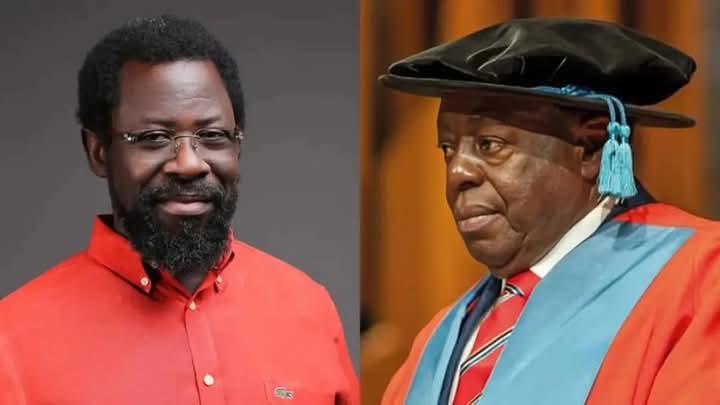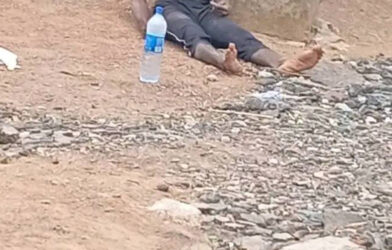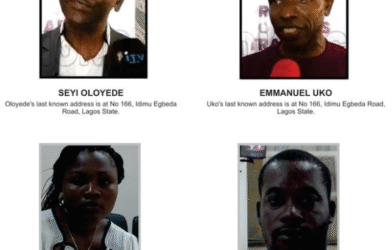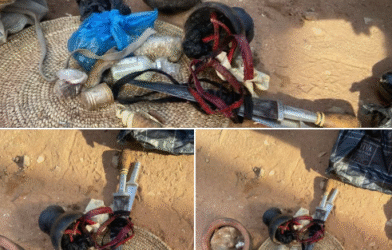Abomination! Market noise never drowns the marketplace. The dog never gets executed for barking, nor the ram beheaded for butting. The market takes no roll call and yet misses nobody: Ojà Òyìngbò ò mò pé énìkan ò wá. Daily, good and evil walk the face of the earth: T’ibi, t’ire la da ilé ayé. Good looking for good. Evil looking for evil. Nevertheless, the wheel of life grinds on. For you, for me, for everyone.
In a jiffy, I’ll disembark from this philosophical horse and return to my thematic preoccupation – Farotimi Vs. Babalola. But, oh, this horse! It’s adamant. See, see, it’s nuzzling against my hand, seeking attention, wanting me to ride it a little more. OK, I’ll ride.
Life is a spectrum of colours viewers view through convex and concave lenses. Lo, I’ll not judge, lest I be judged. Because everyone has the right to their views. Some eyes see far beyond the nose. Some eyes see just the nose…some see nothing, blind. Yet, eyes believe what they see because seeing, they say, is believing. But shouldn’t sight and belief stand the test of validity?
Curving outwards at the centre, the convex lens is used for long-sightedness, aka hyperopia, because it converges and focuses light rays to a specific point. The concave lens, which curves inwards at the centre, is used to correct short-sightedness (myopia) because it diverges light rays. Basically, a convex lens magnifies objects, while a concave lens makes objects appear smaller.
It needs no ocular aid to see that as Obidients, Farotimi and Babalola share a common political identity in the Labour Party, like Tali and Tunde shared an education legacy in Archbishop Aggey Memorial Secondary School, Mushin. But if Tali and Tunde had been a little more circumspect, probably, the outcome of their disagreement wouldn’t have ended in a bitter fight. Maybe.
Here comes an aside. Nigerians with long-sighted lenses see state failure at the base of the insecurity swipe British Conservative Party Leader, Kemi Badenoch, took at her fatherland. But some see a thriving nation in the short-sighted lens with which Vice President Kashim Shettima viewed Badenoch’s comments. However, a lot of other commenters, who belong to a third group, have neither sight nor lenses but are yet vehement in their opacity. This third group are those who are neither deep nor shallow.
The concave lens and opaque groups listen only to their own voices. They don’t weigh arguments on the basis of merit. Those who say the 2022 World Cup was rigged by FIFA in favour of Argentina belong to one of these two groups.
You can nail Badenoch to the cross of political hypocrisy, yes; but the validity of her mockery of Nigeria is unassailable. For Kashim the son of Shettima, however, it does not befit your mouth, Your Excellency, to deodourise Nigeria’s insecurity by attempting to unpin the letters of Badenoch’s Yoruba identity because she highlighted Nigeria’s reality. Who doesn’t know Nigeria is the giant shark stranded ashore at night, praying for daybreak to tarry, praying for a strong tide to hit the shore and sweep it back to the deep? Vultures hover overhead.
Back to the Farotimi-Babalola rumble in the judiciary. The emanating legal tussle has divided the country along political, demographic and ethnic lines, with Nigerians viewing the tussle from convex, concave and opaque dimensions. This is why the majority of those backing Babalola consist of old and middle-aged conservative, pro-establishment diehards who see Farotimi’s daredevilry as deserving of jail sentence just as those backing the young lawyer consist mainly of Nigerian youths who are angry that the system has turned their lives inside out.
For his courage and conviction, I strongly commend Farotimi for saying that no one should beg Babalola or anybody on his behalf and for also insisting on having his day in court.
What this shows is that Farotimi is resolved to take anything the Nigerian legal system throws at him. I’m sure he has weighed the risk to his life, family, freedom and daily bread, knowing full well that stardom is likely the only dividend of his martyrdom.
However, for all the bangarang it has generated, the roar in Farotimi’s thunder of allegations will die, sadly, like a whimper, and the wheel of Nigeria’s judiciary will grind on, after some time, forgetting the Imesi-Ile indigene and his harakiri.
This is so because most of his allegations, many of which are sweeping generalisations, only reflect the symptoms of the rot in the judiciary and not the root causes of the rot such as poor remuneration and judicial independence.
It lies within Farotimi’s rights to allege, no doubt, just as the onus of proof lies with me. I suspect the man in the eye of the storm knows he can’t prove all the allegations against Babalola in court, but he would be satisfied to do time behind bars – in the satisfaction that he succeeded in casting aspersions on the name of the nonagenarian. I think that’s Farotimi’s ultimate goal. Farotimi, a prisoner of his convictions.
With the benefit of hindsight, there are a few nuggets that could have been useful to Farotimi in this type of war. One, he shouldn’t have read Law. Two, he shouldn’t have adopted the sweeping generalisations strategy he chose. Three, he should have got concrete evidence like bank transactions, voice notes, text messages etc. Lastly, he should have studied a democratic course like mass communication or language or music or theatre arts or history or political science etc and used his art as a weapon to fight his struggles.
Law, like medicine, military and priesthood, is an ultra-conservative profession which, ironically, seeks progressive change in society.
A medical practitioner, Dr Kunle Sehinde, whom King Sunny Ade praised over 50 years ago for medical dexterity, was queried for advertising by the medical authorities. But KSA only praised Sehinde for saving his life after an accident and not for pecuniary gain.
Also, around 2004, I was in an Osogbo magistrate’s court headed by Mr Jide Falola when Chief Niyi Akintola (SAN), during court proceedings, angrily informed the magistrate that he could no longer accord the plaintiffs’ lead counsel, Mr Kunle Kalejaye, the privilege to sit on the same bench with him. Kalejaye had not become a Senior Advocate of Nigeria when the case was heard.
Kalejaye appeared for the Osun State Government headed by Prince Olagunsoye Oyinlola, while Akintola appeared for then-Secretary to the State Government, Chief Sola Akinwunmi, and then-Commissioner for Finance, Chief Lere Adebayo, both members of the Chief Bisi Akande administration. Akinwunmi and Adebayo were accused of fraud in the contract execution of the Osun State Governor’s Office, Abere.
Falola acceded to Akintola’s request by ordering Kalejaye to leave the whole of the front bench to Akintola, who watched with satisfaction as Kalejaye packed his bag and baggage, and made his way to one of the packed benches at the back.
However, at the next sitting of the court, Kalejaye got his revenge against Akintola when he told the court that it was illegal for a SAN to physically appear in a magistrate’s court, praying that Akintola recused himself from the case and Falola upheld Kalejaye’s objection. This necessitated Mr Femi Falana, who wasn’t a SAN then, to take over the case. This is the way of Law: slow, laborious and methodical.
But Farotimi appeared impatient with the way the Nigerian legal system works; he wanted much more. So, he took his case to the court of public opinion while Babalola headed in the opposite direction – to the court of law.
The age-long small pocket hanging at the back of lawyers’ gowns also confirms the conservative nature of the legal profession. The small pocket was used to collect shilling payments by the clients many years ago.
That the corruption in the Nigeria legal system is maggotty, is never in doubt. Falana, in 2013, 2015, 2016, 2017, 2019 and 2023, lamented naked corruption in the judiciary. In a paper, “The Rot in the Judiciary,” presented in 2013, Falana recalled how then-President of the Court of Appeal, Justice Ayo Salami, rejected promotion to the Supreme Court and turned around to accuse the Chief Justice of Nigeria, Justice Aloysius Katsina-Alu, in a suit, saying Katsina-Alu attempted to subvert justice in a Sokoto governorship election petition.
According to Falana in his paper, Salami was suspected of having sympathy for a leading opposition party in 2011, adding that the Federal Judicial Service Commission chaired by Katsina-Alu recommended Salami for promotion. That was the time the Appeal Court held the power of life and death over governorship election petitions. Some judges like Justice Thomas Naron and Justice Charles Archibong were indicted and recommended for compulsory retirement from service by the National Judicial Council presided over by then-CJN, Justice Mariam Alooma Mukhtar.
The judiciary is rotten. Everyone knows. Babalola is justifiably hurting and angry. The cockroach called Dele Farotimi is adamant and poisonous. Supreme Cocks watch. Appeal Cocks watch. High Cocks watch. SANyeri Cocks watch. Who will eat the cockroach?
…Concluded.















Comments are closed